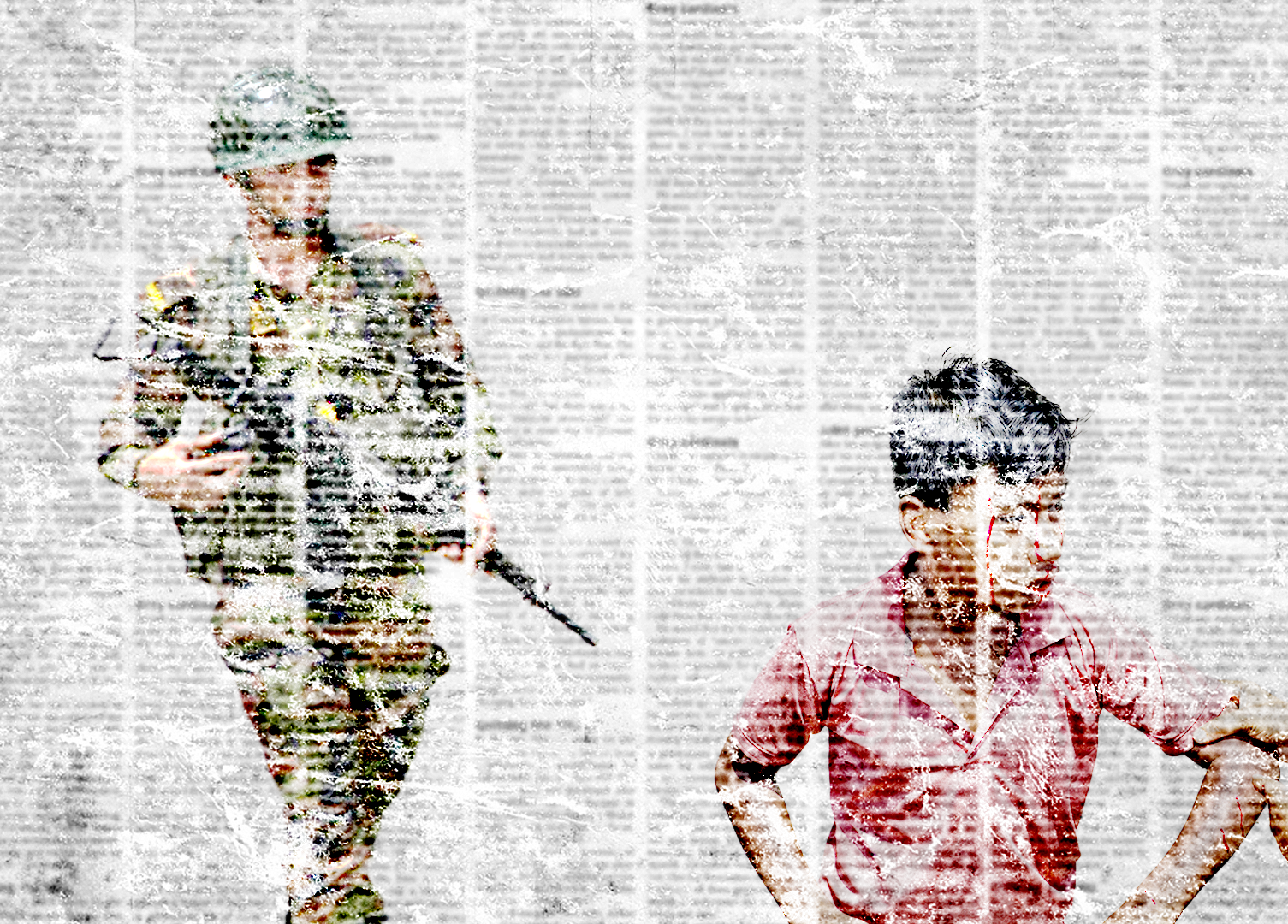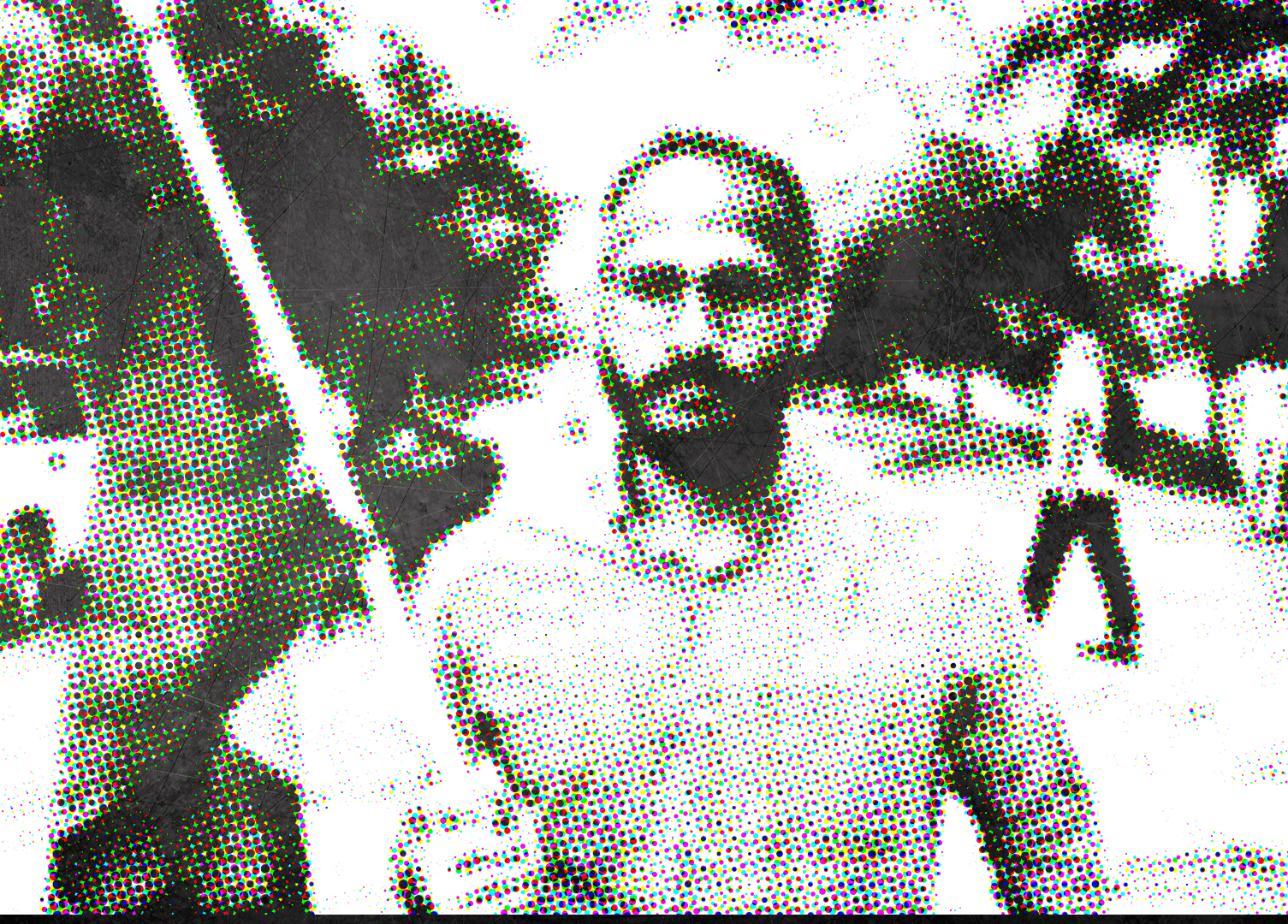Death everywhere
Decades later, your story will be one of many, told in the form of songs remembering the dark day when the government murdered Bangladeshis.

The first death is cinematic.
He stands alone, fearless, facing with his bare chest a dozen policemen, cowering though armed and armoured. The shot has to be a mistake. Recoil makes the shooter’s helmet fall off. Then the second shot, the killshot, goes home. Everybody knows the name of the martyred Abu Sayed. Nobody knows the name of his murderer.
The second death, in comparison, looks like a mobile game. It’s a top-down view of a police van mowing through two rickshaw drivers. Nobody knows the name of the dead. Nobody knows the name of the killer. The third death to go viral is also vehicular. An armoured truck patrols a road with a corpse lying on top. There’s another video of that same truck, a bored policeman tossing the student’s body aside.
These are the deaths you see. The dramatic moments that define this revolution, filmed, by a one-in-a-million chance, at the point of impact. There are other deaths you hear about; deaths that aren’t filmed but no less poignant.
Students committing extraordinary acts of courage, sacrifice, and intelligence. But also, students being murdered in cold blood. Those are the deaths you read about, how they disappeared or what their dreams were, pictures of children smiling with their relatives; everyday moments that become meteors of a revolution.
Then there are deaths you hear about.
These are both mysterious and personally connected. Your friend’s neighbour was shot in the head. Your neighbour’s friend hasn’t come home. You may already have encountered these people, so you perhaps have an idea of a shy smile, a brown t-shirt, a strong cologne, and you think, ‘ah, that’s who it is, inna Lillahi wa inna ilayhi raji'un, I hope it was quick and painless.'
But most of these deaths don’t go viral, so you don’t have the same vivid picture of mothers weeping, potential nipped in the bud, a bright future now rotting in dirt. It’s just one less person you’ll see at dawats.
Reports and rumours fly like birds. There is a persistent one about how hospitals are overwhelmed, turning dying patients away because there is nowhere for them to wait. Everywhere you look, death. Every story you hear is tinged with death. You are individually and collectively unable to deal with so much death. So much disappearance. People have disappeared often enough. They disappeared in great numbers in 1990 and in 1971. But you at least didn’t have to look upon their faces or confront their extinguished humanity so many times a day.
The last death you see is footage shot from a balcony. In the road below, a group of uniformed paramilitary men pull a living young man out of a gate. Shots are fired. The body is dragged off. A death both immediate and anonymous, visceral and mundane. You see a person die, witnessing the most intimate of human acts, but you know they will remain nameless, as nameless as the law enforcement officials executing them without consequence. The shot, and the subsequent slump, look like someone pressed a switch to shut off a toy.
Someone else presses a different switch. You are shut out of the Internet. A minute ago, you were part of the grand collective of humanity. At your fingertips was knowledge, entertainment, news, friendship, support. Now, you are as bereft as an outer planet in a remote orbit. No one can hear you scream.
Decades later, your story will be one of many, told in the form of songs remembering the dark day when the government murdered Bangladeshis. But for now, you cannot ask for help. You are the tiger’s twitching paw. You are a fever dream. You are a statistic. You do not exist.
One of the infamous artefacts of Bangladesh’s War of Liberation was the Pakistani general Rao Farman Ali’s diary which contained a list of Bangladeshi intellectuals— the blueprint for the Dhaka University Massacre. On that same campus, today, law enforcement officials have tools to make much more advanced, detailed, specific lists. Tools the American government developed to fight urban wars in the Middle East, to eavesdrop on foreign governments. These same tools are used to target mobile phones that were present in a location and correlate those phones with social media posts and, often, successfully on to individuals and their addresses.

You think of Abu Sayed, the first death.
The man died like a hero — alone and unarmed against a group of shaking riflemen. But would he have been a hero if you didn’t see his chest shake on impact? If you didn’t see him stand there with his shirt off and his arms wide open, inviting sticks and stones that may break his bones, not expecting the bullets that killed him? You think about all the other deaths. The colleges of social media posts pronouncing victims. The picture of the crying woman, beaten and bloodied.
That was in broad daylight. When the police officer says “ajke jodi ber hon, direct guli korbo (If you come out today, we’ll directly shoot), he knows he’s being filmed. He doesn’t care, as he also knows there are no consequences.
The vehicles running over protesters, the policemen sniping at hiding students through BRAC University’s closed gates, and the headshots in residential areas. During the day, the city sleeps like a tiger, in fitful silence punctuated by twitches of gunshots and screams. At night, the jungle is humid with the acrid smoke of poison being disseminated by helicopters. Shut off from the world and each other, in a city that’s burning, being tear-gassed and shot at on the ground and poisoned from above, being picked up, tortured, spat out a shattered corpse. Without even the flimsy protection of the social posts you would see in the first couple of days—help us escape, donate blood, has someone seen my sister?
Death comes closer, moving in the shadows.
Last week, death was a vivid flare. Each death was shocking. Now it’s everywhere, all around you, touching everybody you know. Everybody experiences it in whispers. You do not know where your family is. You do not know how your family is. You do not know if your family is alive. Your family, similarly, does not know where you are, how you are, or whether you are alive. Your friends and family who live abroad endlessly share tips on how to somehow get through to Bangladesh. Call directly. Use an app. Try dialling 01188 instead of +88. The silence remains.
You are told, you tell your family: do not open the door. It is never good news. But it’s late. A young cousin hears the knock, and instinctively opens the door. Without thinking, you walk out to see what’s going on. You bluff, asking what they want. But they can see the fear in your eyes, the dismay in your cousin’s. They know.
Decades later, your story will be one of many, told in the form of songs remembering the dark day when the government murdered Bangladeshis. But for now, you cannot ask for help. You are the tiger’s twitching paw. You are a fever dream. You are a statistic. You do not exist.●
Arafat Kazi is a Bangladeshi musician.